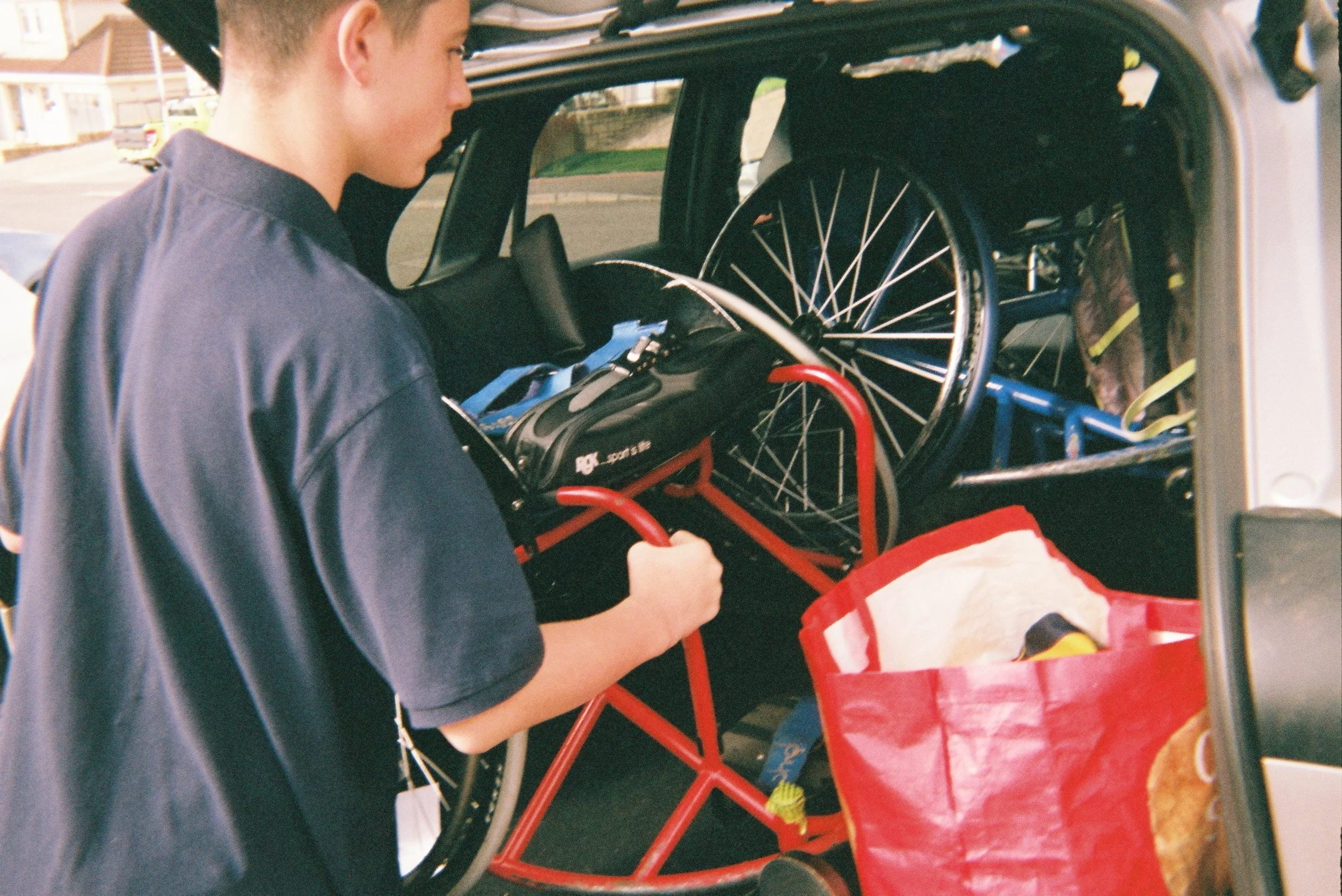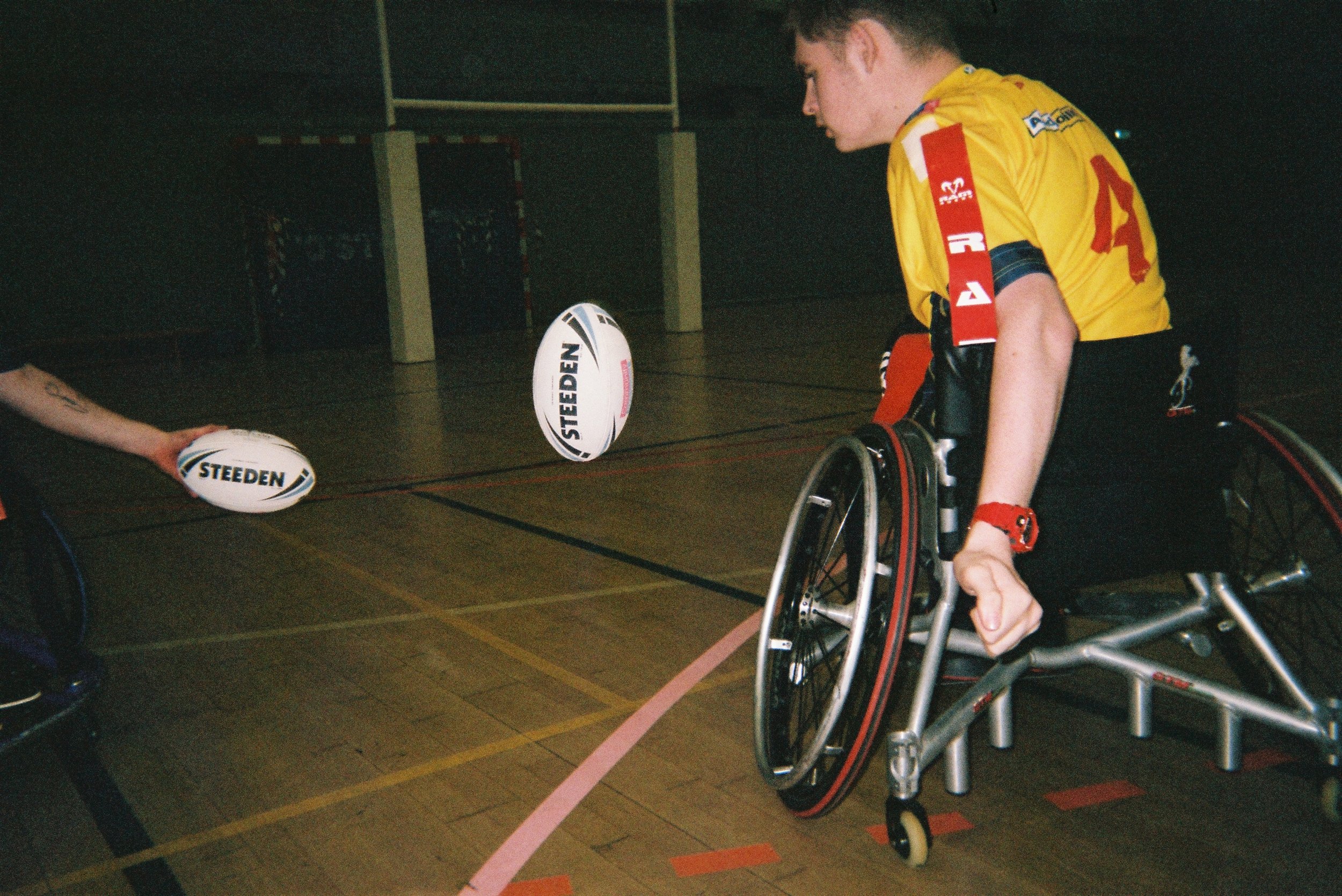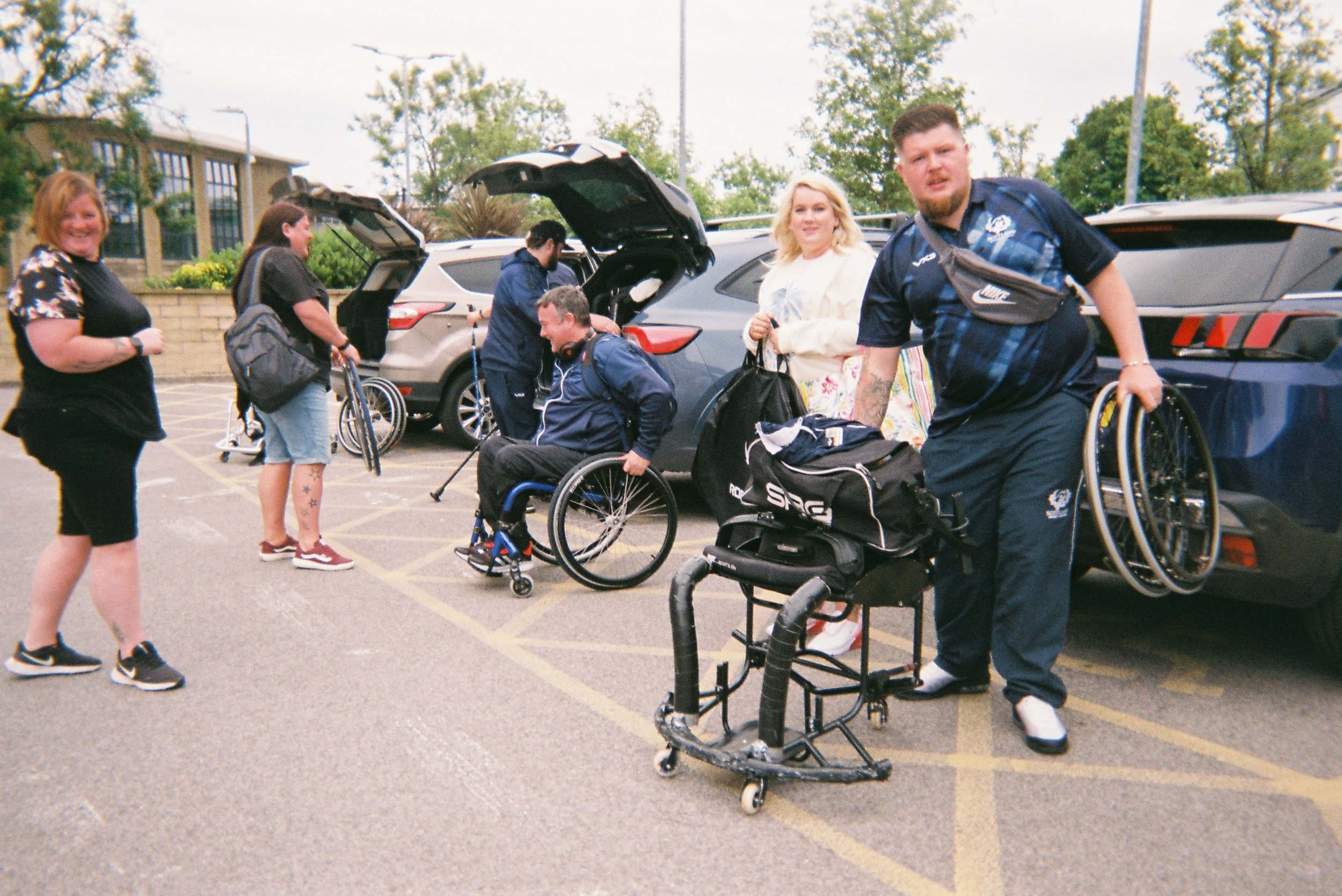Keeping It In The Family
Michael Mellon, Scotland
We teamed up with Rugby League World Cup 2021 for a special series. From Jamaica, Brazil and Lebanon, to England, New Zealand and the Cook Islands, our series documents the personal journeys of players to the Rugby League World Cup 2021 – across the Men’s, Women’s, and Wheelchair tournaments.
Michael Mellon is the Scotland Wheelchair captain, achieving the rare feat of playing international sport with his son.
Can you introduce yourself and tell us about your rugby journey?
My name is Michael Mellon and I have been playing rugby since the age of four. My current rugby life is based around Wheelchair rugby league with Dundee Dragons and Scotland. I am the current Scotland captain and am looking forward to this year’s delayed Rugby League World Cup.
When I was younger, I participated in rugby union for my school and county. When I joined the Royal Air Force I played for my squadron, station, and for the Royal Air Force Regiment. I also enjoyed playing rugby league for RAF Honington. My dad was a keen rugby player and was also in the Royal Air Force, so from an early age I used to go along and support him. I obviously enjoyed watching the game and decided to get involved.
My worst times were when I broke my leg which ended my running, rugby, and RAF career. I was playing rugby for the Royal Air Force in 2001 and unfortunately a bad tackle fractured both bones in my lower leg. Whilst in hospital, I developed compartment syndrome, which makes the leg swell and stops oxygenated blood getting to the muscles, and the pressure build-up in the leg damaged my nerves. As a result, I had 14 operations to repair my broken bones and to try reducing the nerve damage. After years of going in and out of hospital, they decided to amputate below my knee.
Six months after my amputation, I decided to join Dundee Dragons wheelchair rugby league. My best time in rugby was getting my first Scotland cap against Wales in 2014, it was a real honour and privilege to represent my country. I had only been playing the sport for eight weeks! It has been a rollercoaster ride. I am now approaching 30 caps for my country with hopefully many more to come.
My wife Deborah and three children always come to watch me train and play. My son Ryan and my eldest daughter Eve really enjoyed rugby and wanted to give the wheelchair game a shot. It turned out that Ryan was a very talented wheelchair rugby league player. At the age of 16 he was eligible to play at international level. It was a great day for the whole family when I got my 25th cap and Ryan got his first cap at the same match, also against Wales.
What did you try to show with the photos? Was there any wider meaning with any of the photos?
Wheelchair rugby league is a fast-paced and enjoyable game, so I tried to capture action shots. You can also see my welding machine and a broken wheelchair. The game has massive impacts as the chairs collide and on occasions the strong frames can get damaged and need to be repaired.
The photos show my Scotland teammates in various locations around the UK. We tend to train and play our home games in Dundee in Scotland, but the vast majority of our competitive games are in England or Wales, as we only have one wheelchair rugby league team in Scotland. We are in the process of setting up a second team based in Glasgow.
We train really hard together and also as individuals. Being a part of the Scotland team is not just about what we do in the chairs at training camps or in the gym in our own time. It is great to spend time with each other away and just relax, enjoy a meal together, and have a few laughs.
I took photos of my son Ryan, who is also a Scotland player. Ryan and I joined strength lab CrossFit gym prior to Ryan joining the Army. The staff there have been amazing at getting me fit and ready for the World Cup.
Just before he joined the Army, Ryan was about to play his last match for Kirkcaldy Rugby Club after joining the club at the age of 4. However, the opposition turned up short of players, so Ryan and a few of his close friends volunteered to step in to make up the numbers. It was great to see the selfless commitment by the boys to help the opposition - true rugby core values in action.
What does rugby league and playing for your country mean to you?
I truly enjoy playing any sport as I am a very competitive person. But over the years I always came back to playing wheelchair rugby league. No matter what sport I play, I always want to be the best that I can be. I believe this attitude has gained me my spot within the Scotland squad over the last eight years. It really is an honour to represent my country and I always give 100% when I train and play.
What does it mean to play with your son?
I was lucky enough to play running rugby with my dad at a competitive level while we both served in the forces. Due to my amputation, I knew that would never be the case for me and Ryan. That was until we found Wheelchair rugby league.
We have a great relationship on the pitch. I was passing my rugby knowledge and experience on to him and he was always testing my speed and fitness, as we are both very competitive individuals. The whole team are gutted that Ryan will miss the World Cup this year. He worked really hard in the chair and at the gym before he left for the Army. I am sure there will be plenty more opportunities for Ryan in the future with Scotland and Wheelchair rugby league. I know the Army have a wheelchair team.
What role does rugby league play in your community and country?
Dundee Dragons was set up by Elizabeth Ferris, who unfortunately became paralysed as a young woman. She realised there were no sports activities for people with disabilities in her area so decided to set up the Dundee Dragons wheelchair rugby league club. The club has evolved over the years from a Wheelchair rugby league club to participate in many different sports, such as Wheelchair basketball, badminton, tennis, golf, and curling. Over the years the club has helped hundreds of people find or get back into sport.
Rugby league is growing in Scotland, we see more and more clubs starting up. Rugby league offers people the chance to keep fit socialise and enjoy playing sport. Several clubs help out with local charities and fundraising events. The game touches so many people’s lives across the country.
Clearly the biggest opportunity for individuals playing wheelchair sports in Scotland is to represent your country. This can lead to other things like professional contracts. You can also represent GB at the highest level of sport which would be the Paralympics, depending on what sport you play.
What ambitions do you have for the future?
In the future my aim is to play my part in Scotland getting their first World Cup win. We have almost tripled our pool of players since the last Rugby League World Cup, which makes great competition for places in the team. It is making guys train harder, get fitter, and fight for their place within the squad.
What do you think the future looks like for Wheelchair rugby league after the RLWC? What would you like to change?
Wheelchair rugby league is a sport for all, you can be able-bodied and play the game alongside people paralysed from the waist down. I would love to see the game moving towards the Paralympics in the future. However, there are changes that need to be made. Obviously, you cannot have able-bodied people playing at the Paralympics. As the sport grows and we get more players there will be less need for able-bodied people to participate. We are looking to expand in Scotland and get more teams and players across the board.
The best way to convince someone to get involved in Wheelchair rugby league by actually getting them to jump into a chair. That is the quickest way to start enjoying the game. It is a fast paced, exciting, tactical game with plenty of big hits to release any built-up tensions you might have.
What are the biggest changes happening at the moment in rugby league?
This will be the first time the men’s game, women’s game, and the Wheelchair game will be treated equally across the board at the Rugby League World Cup. Prize money will be the same across all teams, which says a lot! Funding for Wheelchair players in Scotland is getting better. The last World Cup cost each player approximately £1,500 to participate. I believe this year there will be zero cost for the players.










